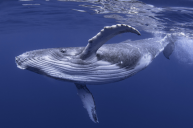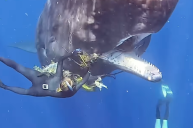An Alaska fisherman admitted to falsely labeling his catch and ordering his crew to shoot a sperm whale off the Alaskan coast, according to a plea agreement unsealed earlier this month by a federal court.
On May 15, Dugan Daniels pleaded guilty to one count of false labeling and one count of violating the Endangered Species Act. In exchange for the guilty plea, prosecutors recommended six months in prison and a $25,000 fine.
Lying About Where He Caught Fish
According to the agreement, Daniels submitted false records on two occasions about fish he harvested between October and November 2020. Prosecutors say the amount of fish he collected had a retail value of roughly $127,528.
During the first trip, Daniels told regulators that he caught 1,832 pounds of sablefish as well as 2,145 pounds of halibut. Although he said he had a permit to fish, prosecutors say he did not. Investigators said they used GPS data to identify where Daniels illegally deployed his gear and caught the fish.
On the second trip, Daniels illegally caught 11,682 pounds of sablefish as well as 1,119 pounds of halibut. Along with GPS data, investigators say they uncovered text messages in which Daniels said he knew what he was doing was illegal. Additionally, Daniels doctored logbooks and reports to make it appear as if he harvested the fish legally.
Trying to Kill a Sperm Whale
Then, investigators also discovered that Daniels had his crew try to kill a sperm whale in March 2020. According to the agreement, Daniels ordered a crewman to shoot the whale and then ram it with the boat about 31 nautical miles from Yakobi Island, Alaska.
Although it's unclear if Daniels was successful in killing the whale, prosecutors say his boat came within five feet of ramming it. Also, they said text messages made clear "his desire to kill the sperm whale."
The National Oceanic and Atmospheric Administration describes sperm whales as the "largest of the toothed whales." Although populations vary by location, it vastly decreased due to commercial fishing between the 1800s to 1980s. The U.S. listed it as an endangered species beginning in 1970.
According to the case docket, Daniels is scheduled to appear in a Juneau federal court on June 6 for an arraignment.




